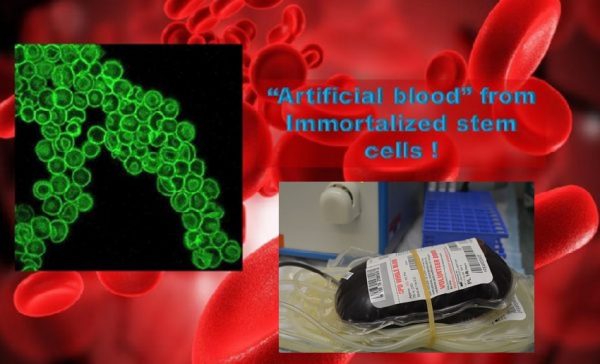
Unlimited Artificial blood from Immortalized stem cells
Often, we hear about shortage of blood supply in blood banks. There are thousands of donors who donate blood frequently as they know the value of donating blood. Donating blood saves lives and families. However, lack of awareness or scared of thought of losing blood many does not want to donate blood. People who live in war zone countries and soldiers who are protecting us suffer from wounds and when they need, blood should be available. Blood becomes shortage when there is a difficulty in finding matching blood types and storage issues.
According to WHO, every year 108 million donations of blood made globally but in developing countries lack donor numbers and short of capacity to store blood in larger quantities and screening blood for diseases makes it difficult to get blood on time.
Artificial blood is product made to act as a substitute for RBC (Red Blood Cells) to transport oxygen and carbon dioxide throughout the body.
Unlimited Artificial blood synthesis using stem cells
Scientists from various research Institute has been working on producing artificial blood. One of the earlier work has grown mature RBC from donated stem cells to make a concoction to store in room temperature, to reduce risk of disease and compatible with any blood group. However, the problem was small numbers of RBC was produced before a new donation of stem cells is required. This procedure relies upon a type of stem cell that manufactures RBC in the human body.
Recently researchers from University of Bristol and NHS blood and transplant came up with a alternate solution by developing immortalized cell lines that can be cultured indefinitely to produce artificial blood on much larger number (scale). This technique created immortal cells by manipulating stem cells in a way the traps stem cells in early stage of development.
Instead of turning adult stem cells directly to mature RBC, premature RBC cells called erythroblasts are used. Immortalizing erythroblasts to get generate continuous supply of mature RBC results in large scale of artificial blood production. It means, when stem cells are in early stage of development they divide frequently to produce unlimited number of cells!
According to Jan Frayne one of the author of the research studies, “by taking an alternative approach we have generated the first human immortalized adult erythroid line (Bristol Erythroid Line Adult or BEL-A) and in doing so, we have demonstrated a feasible way to sustainable manufacture RBC for clinical use from invitro culture”
According to co-author Professor Dave Anstee of National Institute for Health Research and Blood transplant research unit, at present the first therapeutic use of cultured RBC product is likely to be for patients with rare blood groups because suitable RBC donations can be difficult to source. The intention of producing artificial blood in large quantity by using this alternate procedure is not to replace blood donation but to provide specialist treatment for specific patients group. Moreover patients who suffer from life threatening conditions like sickle cell disease, thalassemia who require multiple transfusion of well-matched blood are going to get more benefit from this.
No HBOC’s are currently approved for use on humans in the US or Europe. The first clinical trial of artificial blood transfusion will possibly take place this year 2018 and for now they will use traditional technique method and not the recent alternate research method.
The research has been published in Nature Communications.
References:
- https://www.chemistryworld.com
- https://www.newscientist.com
- https://www.sciencealert.com/
Blood donation Image by Robert DeLaRosa from Pixabay (Free for commercial use)
Author: Sumana Rao | Posted on: April 25, 2019
« Actress Selma Blair fights MS Good Nutrition During Cancer Treatment »






















Write a comment